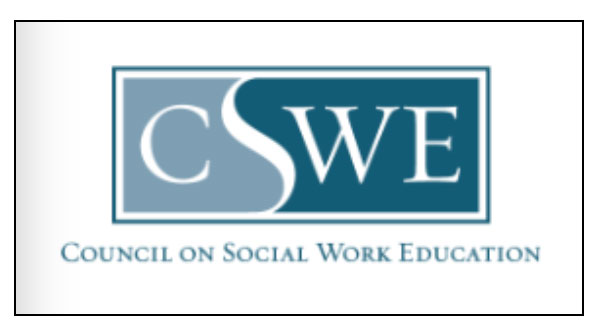CSWE Accreditation for the UNE Online Master of Social Work Program
We are excited to announce that the MSW program has once again earned CSWE accreditation, making this the 30th year the MSW program has been continuously accredited by CSWE!
In acknowledgment of the 2020 CSWE re-accreditation of the Graduate Programs in Social Work, we would like to share this blog post that covers the benefits, process, and rigors of the accreditation process and specifically how it relates to our program here at UNE.
What is CSWE?
The Council on Social Work Education (CSWE) is the governing body that oversees all of the social work education programs throughout the United States. CSWE’s Commission on Accreditation is recognized by the Council for Higher Education Accreditation as the sole accrediting agency for social work education in the United States and its territories.
All CSWE-accredited programs must adhere to Educational Policy and Accreditation Standards (EPAS) standards and must tailor the curriculum to map to these standards.
Mapping the curriculum to CSWE competencies
CSWE developed their Educational Policy and Accreditation Standards (EPAS) as a set of standards and competencies that schools must meet in order to achieve accreditation. Schools must map every aspect of their curricula back to these competencies – in fact, all UNE Online classes in the Social Work program are mapped to EPAS competencies. This ensures that the classes are balanced and all subjects are addressed.
Mapping the MSW curriculum to CSWE standards is one way that UNE Online provides students with the education that allows them to be the best social worker they can be.
Accreditation evolves along with the needs of society
Just as each class must evolve with what’s current in the world of social work, EPAS competencies also evolve.
CSWE standards take into account what is current and relevant in today’s society. Using relevant real-time examples encourages students to consider how different circumstances affect their clients’ lives as a whole, including their friends, family, and community. Clients can be more effectively treated holistically, in the context of their environment.
Coursework and fieldwork – weighted evenly
According to CSWE, field education is the signature pedagogy for social work education. The intent of field education is to integrate the theoretical and conceptual contributions of the classroom with the practical skills of the practicum setting.
It is a basic precept of social work education that the two interrelated components of curriculum – classroom and field – are of equal importance within the curriculum, and each contributes to the development of the requisite competencies of professional practice.
Field education is systematically designed, supervised, coordinated, and evaluated based on criteria by which students demonstrate the CSWE competencies.
“We believe that application and integration of theoretical knowledge in the field placement are essential to the provision of a rich social work education.”
– Jennifer O’Neil, PhD, LCSW, Director, Graduate Programs in Social Work Online
Field placements are mapped to CSWE competencies
As a CSWE-accredited school, it is UNE’s role to give students the skills needed to be professional social workers who know the importance of cultural humility, evidence-based interventions, and strengths-based perspective. Fieldwork is a critical piece of that preparation. Every CSWE-accredited program has a field placement requirement, and as such, fieldwork is a signature piece of the UNE curriculum.
By design, courses are taken in a particular order so that students gain academic skills that build on each other. The field experience is where students integrate their didactic skills with their practical skills – it’s where the rubber hits the road, so to speak.
Questions about CSWE accreditation, or about the MSW program?
Learn more from our MSW program guide
The CSWE accreditation cycle
CSWE accreditation follows an 8-year cycle. The first step is to write a rigorous self-study that outlines the program, including faculty, faculty ratios, faculty credentials, the positions that faculty hold, the research that faculty is doing, the courses and electives offered, syllabi, statistics from assignments, and how assignments map to learning outcomes required by the EPAS competencies.
The CSWE board reads the self-study, considers it, and sends back a Letter of Instruction, which is a document that outlines any areas that may be unclear in the self-study. At this time, the institution also receives a date for the site visit, which can be 1-2 days. At the scheduled time, the evaluator from a CSWE-accredited institution arrives with the Letter of Instruction to meet with various stakeholders and ask clarifying questions.
The onsite evaluator meets with senior university staff, the college dean, program administration, faculty, and students. The day concludes with an exit interview with senior program staff and the dean to review the evaluator’s observations from the day. The school generally hears back from CSWE within a few weeks of the site visit.
Why should a student look for a CSWE-accredited school?
Accreditation provides reasonable assurance about the quality of the program and the competence of students graduating from the program.
CSWE accreditation is also important for students seeking licensure. Professional licenses within the field of social work require a college degree from a CSWE-accredited program.
Accreditation ensures that students receive the same foundational knowledge that encompasses all essential areas of social work, on both a clinical and macro level, based upon a set series of standards. Accreditation is proof of a school’s promise to provide a quality and consistent education.
The majority of our social workers in the US are generalists, necessitating a wide variety of skills. CSWE accreditation helps us analyze our program and make it better, to ensure that we are teaching our students the skills that allow them to do what they desire after their graduation.
The standards that CSWE uses to guide re-accreditation allow us, as a program, to assess each class to ensure that we are providing the quality of education that creates ethical and competent social workers.
Download our free MSW program guide
Tags: accreditation | CSWE accreditation | Master of Social Work | MSW | Social Work